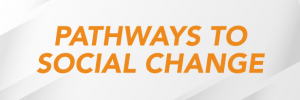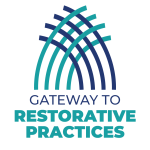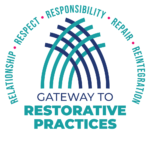
Seven hundred people from all over the world virtually attended the International Institute of Restorative Practices Pathways to Social Change Online Conference last week, January 26-28. Three restorative practices trainers and I were able to be a part of this significant time.
Put 20% First
Cami Anderson, Director of Third Word Solutions, says that if we want to change schools, we need to
“Put the 20% of kids first. Design the school for them. It will make things radically different.”
What does she mean by the 20%? Typically, in schools, about 15% of the students have challenges following school guidelines while five percent are students who regularly demonstrate challenging behaviors. I wonder what schools would look like if we tried this radical idea.
Sexual Violence
Two women from their organization, One in Four in Ireland, did a session on addressing sexual violence. In Ireland, only 5% of perpetrators face criminal charges. The other 95% are free to sexually abuse others until they are caught. The impact on victims doesn’t stop when the abuse stops. Consequences like not being believed, blame, and shame can last a lifetime. It isn’t only Ireland with sexual violence challenges. Every six minutes a woman in the United States is raped. Of those attacks, only 10% are reported. After working for 20 years they are tentatively hopeful for changes.
Storytelling Quilt
The Church Council on Justice and Corrections (CCJC) is a national and ecumenical organization in Canada established in 1972. I learned about their interactive justice storytelling quilt. It features 40 blocks with 13 stories in French and 27 stories in English created by victims and offenders. To see this inspiring quilt, go to https://ccjc.ca/the-quilt/
Authenticity Encouraged
Dr. Shelley Jones-Holt of Leadership Legacy shared that the environment is created by the teacher or leader invests themselves in the environment.
As educators we create space where everyone can be their authentic self. She discussed the challenges and barriers to being ourselves such as who are you? what’s your voice? and recognizing all parts of your identity. If the adults can’t be authentic, we can’t expect the kids to be authentic. She encouraged us to give our administrators the freedom to be authentic.
Covid 19 Challenges
St. Claire Adraian, school principal of Academy of the City Charter School in Queens, New York revealed some of the impact of Covid-19 on discipline. Group circles went great before the pandemic. Now he is seeing negative behaviors he hasn’t seen in years and hearing push back about using restorative practices. There’s pressure to return to punitive discipline as it is faster.
This is challenging especially if people want the immediate gratification of punishment. We must understand the impact of social emotional learning. Changing behavior and healing takes time.
I’d like to summarize by using a quote by Bob Costello, the co-author of Restorative Circles in Schools: Building Community and Enhancing Learning.
- “A basic premise of restorative practices is that the increasingly inappropriate behavior in schools is a direct consequence of the overall loss of connectedness in our society. By fostering inclusion, community, accountability, responsibility, support, nurturing and cooperation, circles restore these qualities to a community or classroom and facilitate the development of character. As a consequence of fostering relationships and a sense of belonging, academic performance, too, flourishes.”
Image: IIRP 2022 Conference Theme

